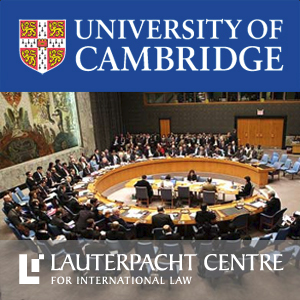'Community Interest in International Energy Law: A European Perspective' by Danae Azaria
Duration: 44 mins 10 secs
Share this media item:
Embed this media item:
Embed this media item:
About this item

| Description: |
The Lauterpacht Centre for International Law (LCIL), University of Cambridge hosts a regular Friday lunchtime lecture series on key areas of International Law. Previous subjects have included UN peacekeeping operations, the advisory jurisdiction of the International Court of Justice, the crime of aggression, whaling, children and military tribunals, and theories and practices for proving individual responsibility criminal responsibility for genocide and crimes against humanity.
This lecture, the joint LCIL-CELS lecture by the CJICL Young Scholar, was entitled 'Community Interest in International Energy Law: A European Perspective', was delivered at the Lauterpacht Centre on Friday 11th March 2016 by Dr Danae Azaria, . For more information about the series, please see the LCIL website at http://www.lcil.cam.ac.uk/ |
|---|
| Created: | 2016-03-14 13:40 |
|---|---|
| Collection: | LCIL International Law Seminar Series MOVED |
| Publisher: | University of Cambridge |
| Copyright: | University of Cambridge |
| Language: | eng (English) |
| Keywords: | International Law; International Public Law; International Energy Law; Energy Policy; |
| Abstract: | In 2009, in the midst of a harsh winter, populations in seventeen states, some of them EU members and others situated in the Balkan region, were left without gas and heating for thirteen days owing to a dispute between Russia and Ukraine concerning exports and transit of gas. The international press reported numerous deaths due to cold temperatures. All states involved were bound by treaty obligations regarding transit, imports and exports of gas: under the Energy Charter Treaty and/or the WTO AgrEeement. While the international responsibility of Ukraine or Russia was not formally invoked, this crisis has had an unprecedented influence on European energy policy and law, and has triggered the conclusion of a number of treaties between EU member states and third states concerning transit pipelines with a view to diversifying energy supplies. It has also raised awareness of the impact of interruptions of energy transit/exports on markets and human populations.
Against this background, the question as to the place of international energy law between reciprocity and community interest becomes pertinent. By using as a case study legal instruments of European focus, the lecture will consider whether treaties on energy trade and transit reflect community interests or are an expression of the individual interests of states generating bilateral/bilateralisable obligations – a question which has consequences in the law of international responsibility, especially standing. It will also reflect on whether exporting and transit states can interrupt energy flows as a countermeasure in response to the breach of international obligations by states dependent on that particular route for the transit of energy, especially in light of the effect that such interruptions may have on the human rights of individuals in importing states. |
|---|---|

